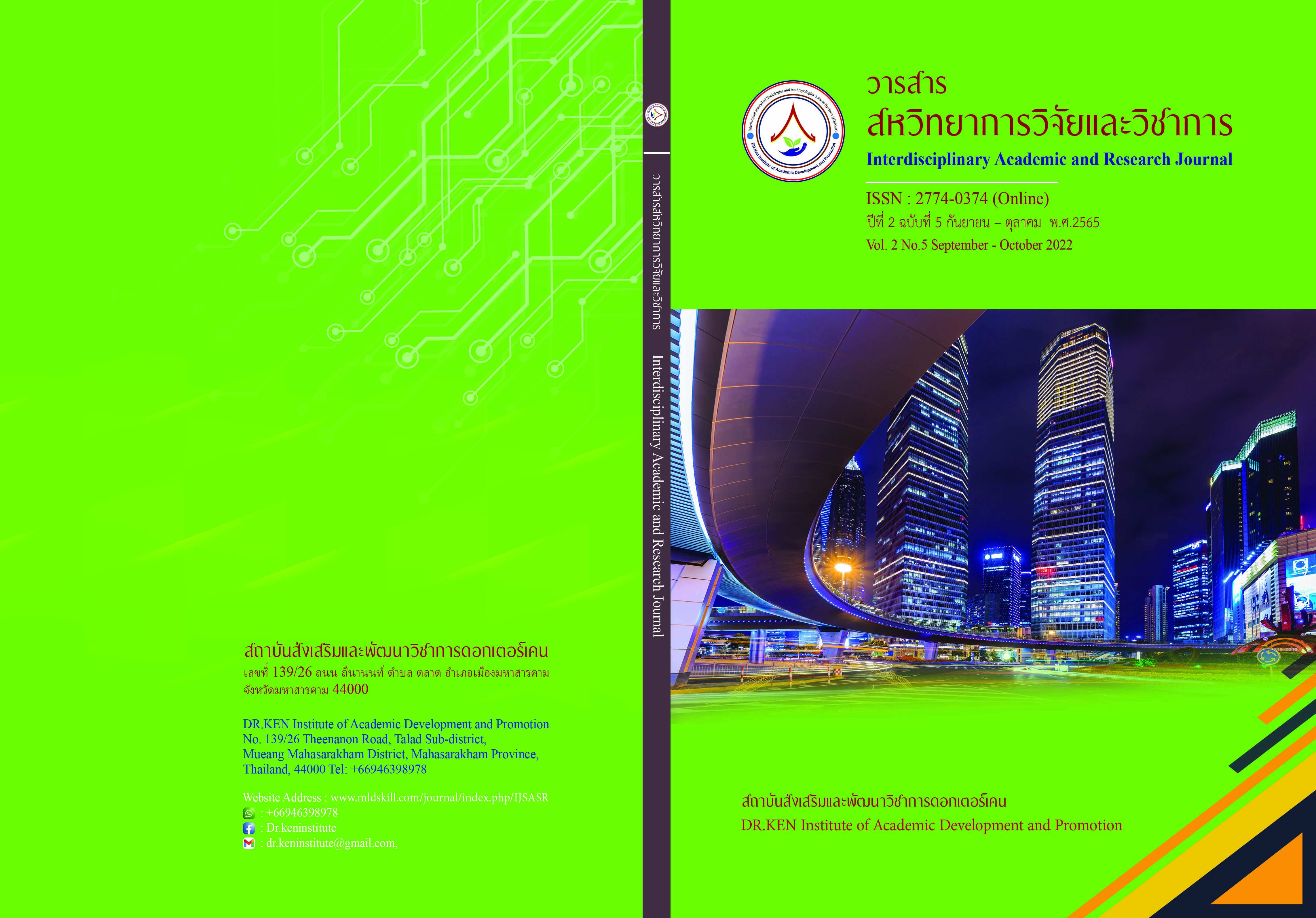Guidelines for the Development of Community-based Ecotourism Routes in the Thung Dok Krachiao Area Chaiyaphum
DOI:
https://doi.org/10.14456/iarj.2022.105Keywords:
Guidelines; , Development; , Ecotourism Routes; , Communities in Thung Dok Krachiao Area; , ChaiyaphumAbstract
Guidelines for the development of community-based ecotourism in the Thung Dok Krachiao area, Chaiyaphum Province, this study synthesizing data on the development of community-based ecotourism in the Thung Dok Krachiao area found that; The area of Thung Dok Krachiew, Chaiyaphum Province, there are outstanding community potentials, including: The attraction potential of the community has a variety of natural attractions, the Krachiao flower field can attract tourists. The Potential in tourism activities, and it was also found that Thung Krachiao is a tourist attraction related to nature that is unique to the locality, Communities have specific activities for each community, which is a community advantage. However, the guidelines for the development of community-based ecotourism routes in the Thung Dok Krachiao area have a clear development direction, and there are government agencies, the private sector, and communities with a positive attitude towards ecotourism. Most of the resources are tourist attractions related to the nature of Thung Krachiew, which is endemic and plays an important role in sustainable ecotourism management. That is to say, promoting community participation by giving local people the opportunity to manage tourism such as expressing opinions, providing services to tourists, selling products to tourists, etc.
References
ณัฏฐพัชร มณีโรจน์ & สุวิทย์ สุวรรณโณ. (2560). การศึกษาความสัมพันธ์ระหว่างองค์ประกอบการท่องเที่ยวการท่องเที่ยวอย่างยั่งยืนและการตัดสินใจเดินทางท่องเที่ยวกับการท่องเที่ยวแบบไม่รีบเร่ง อำเภอพนัสนิคม จังหวัดชลบุรี. วารสารวิชาการศรีปทุม ชลบุรี, 14 (1), 202-213.
บุญเลิศ จิตตั้งวัฒนา. (2542). การพัฒนาการท่องเที่ยวแบบยั่งยืน. เชียงใหม่: คณะมนุษยศาสตร์. มหาวิทยาลัยเชียงใหม่
ไพฑูรย์ พงศะบุตร. (2552). การท่องเที่ยวเชิงนิเวศ. สารานุกรมไทยสำหรับเยาวชน โดยพระราชประสงค์ในพระบาทสมเด็จพระเจ้าอยู่หัว ฉบับเสริมการเรียนรู้ เล่ม 5. พิมพ์ครั้งที่ 5. กรุงเทพฯ : โครงการสารานุกรมไทยสำหรับเยาวชน โดยพระราชประสงค์ในพระบาทสมเด็จพระเจ้าอยู่หัว
สถาบันการท่องเที่ยวโดยชุมชน. (2561). การท่องเที่ยวโดยชุมชน. [Online] http://www.cbt-i.or.th/ [25 ธันวาคม 2561]
อนุช อาภาภิรม. 2545. การสื่อสารการแสวงหาสื่อเพื่อสาธารณะในโลกยุคไร้พรมแดน. กรุงเทพฯ: มูลนิธิศูนย์สื่อเพื่อการพัฒนา
Buckley, R.C. (1993). A Framework for Ecotourism Research Proc LAWASIA 93. Columbo
Jittangwatana, Boonlert. (2007). Sustainable Tourism Development. 2nd edition. Bangkok : Press & Design.
Nzama, A. T, Magi, L. M., & Ngcobo, N.R. (2005). Workbook-I Tourism Workbook for Educators: 2004 Curriculum Statement (Unpublished Tourism Workshop Educational Materials). Centre for Recreation& Tourism, UZ. and Tourism KwaZulu-Natal, University of Zululand.
Strydom, A. J., Mangope, D. & Henama, U. S. (2018). Lessons learned from Successful Community-Based Tourism Case Studies from the Global South. African Journal of Hospitality, Tourism and Leisure, 7(5), 1-13.
World Tourism Organization (WTO). (1993). Sustainable tourism development: A guide for local planners. Madrid: World Tourism Organization.
Downloads
Published
How to Cite
Issue
Section
License
Copyright (c) 2022 Anuwat Tongsaeng, Chot Bodeerat

This work is licensed under a Creative Commons Attribution-NonCommercial-NoDerivatives 4.0 International License.
Copyright on any article in the Interdisciplinary Academic and Research Journal is retained by the author(s) under the under the Creative Commons Attribution-NonCommercial-NoDerivatives 4.0 International License. Permission to use text, content, images, etc. of publication. Any user to read, download, copy, distribute, print, search, or link to the full texts of articles, crawl them for indexing, pass them as data to software, or use them for any other lawful purpose. But do not use it for commercial use or with the intent to benefit any business.
















.png)


